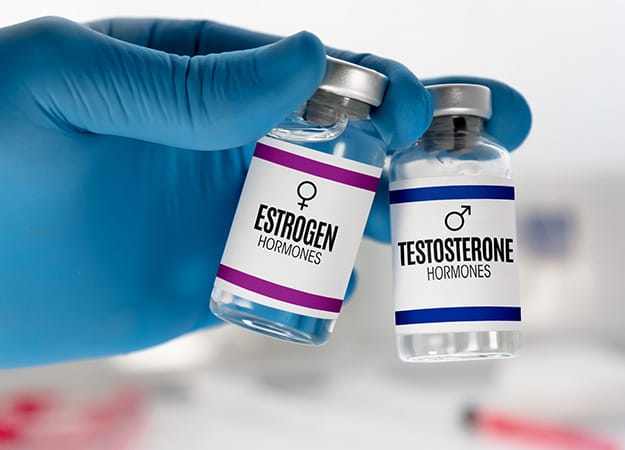Does HRT cause cancer?
This provocative question has sparked widespread debate and concern.
Hormone replacement therapy (HRT) has long been prescribed to alleviate menopause symptoms and improve the quality of life for women.
However, conflicting studies have suggested a potential link between HRT and increased cancer risk, leaving many women apprehensive about its safety.
Fear not, women!
Recent advancements in scientific research have brought us closer to understanding the actual benefit-risk profile of HRT.

Does HRT Cause Cancer? Current Research on Hormone Therapy in Oncology
HRT and Breast Cancer
HRT has been associated with a minor increased risk of breast cancer. Research by the Women’s Health Initiative (WHI) in 2002 shed light on this issue.
The research indicated that HRT, specifically estrogen plus progestin (E + P), resulted in 9 additional breast cancer cases per 10,000 women using the therapy for 5 years or more. This finding raised concerns about the safety of long-term hormone therapy use.
In 2013, an update on the WHI trial, which included an extended follow-up of 13 years and analyzed data from 27,347 patients, further confirmed the increased risk. Despite a reduced risk after discontinuing HRT, the follow-up showed a slight elevation in the cancer rate.
HRT and Endometrial Cancer
HRT and its association with endometrial cancer have also been controversial. Research has shown that chronic exposure of the endometrium to estrogen without progestin increases the risk of endometrial hyperplasia in women with an intact uterus.
A 2015 study demonstrated a significant increase in the incidence rate of endometrial cancer following a decline in HRT prescriptions after the WHI results were published in 2002. Specifically, the 2012 rates were 1.46 times greater than in 2001.
In contrast, a slight reduction was observed in the WHI trial when estrogen plus progestin was used in a continuous combined regimen. This reduction became significant in the post-intervention phase after a cumulative follow-up of 13 years.
The Million Women Study further confirmed the beneficial effects of continuous combined HRT, particularly in obese women. Accordingly, estrogen alone was associated with an increased risk, while continuous combined therapy appeared risk-free.
HRT and Ovarian Cancer
Findings from different studies have also produced conflicting results, making it difficult to draw definitive conclusions on HRT and ovarian cancer.
The WHI study did not find an increased risk of ovarian cancer related to HRT. However, the Million Women Study reported increased ovarian cancer risk for current users with more extended use. The histological type plays a significant role, with the risk greater for serous tumors than in current users with mucinous, endometrioid, or clear cell tumors.
A 2015 meta-analysis indicated a significant increase in ovarian cancer risk among current HRT users, even those with less than 5 years of use. Meanwhile, the risk in former HRT users decreased over time, although a small risk was found even after 10 years.
What Affects the Risk of Cancer?
Hormone Formulation
The choice of hormone formulation plays a significant role in cancer risk. Combined estrogen plus progestin has increased the risk of breast cancer. Progestin is often added to estrogen to protect the endometrium but may contribute to breast cancer development.
On the other hand, patients treated with unopposed estrogen, which means using estrogen alone without progestin, have shown a significant reduction in the risk of breast cancer.
Route of Administration
The route of administration also affects the risk profile of HRT. Hormone pellet implantation has gained attention due to its advantages. This method allows for a consistent absorption of hormones, preventing overdosing and reducing the risk of side effects.
Also, hormone pellets bypass the gastrointestinal tract, limiting side effects in the stomach. Moreover, this route allows longer adherence, producing a long-lasting effect.
Duration of Treatment
The duration of HRT treatment is another critical consideration. According to the position statement by the North American Menopause Society (NAMS) in 2017, breast cancer risk may increase after 5 years of HRT use. Therefore, it is recommended to limit the duration of HRT within this time frame to minimize the risks.
Time of Initiation
The time of initiation of HRT also plays a role in its overall risk-benefit profile. Studies have suggested that starting HRT within 6 years of menopause onset yields the most favorable outcomes. It provides optimal benefits, including relief from menopausal symptoms and potential protective effects against certain health conditions.
In contrast, if HRT is started 10 or more years after menopause onset, the risks may outweigh the benefits, with an increased likelihood of severe side effects.

Not All Treatments Are Equal
Estrogen Alone or Combined Estrogen?
Not all therapies are equal regarding addressing hormone deficiency and minimizing cancer risk. Research has revealed some HRT regimens that do not increase cancer risk, providing a safe remedy for treating the symptoms of low estrogen.
HRT using conjugated equine estrogen (CEE) alone was studied by Anderson et al. on females who had undergone hysterectomy and were between 50 and 79.
After an extended follow-up of 11.8 years, patients receiving only estrogen saw a substantial decline in the incidence of all breast cancer, particularly in infiltrating ductal carcinoma. No changes were found for cancers with and without receptors, either. Results indicated that the CEE group had fewer breast cancer-related fatalities than placebo.
Mammography Density: A Cancer Indicator
Research also suggests that HRT using estrogen alone has a lower impact on mammography density, an indicator associated with breast cancer.
Typically, mammography density changes with age and in response to hormonal exposure, and increased breast density can be strongly linked to a higher risk of aggressive breast tumor subtypes, particularly in postmenopausal women using combined estrogen.
In the WHI trial, women treated with estrogens plus progestins had a higher abnormal mammography rate requiring further testing, such as biopsy, than those on a placebo. In contrast, estrogen alone has a lesser impact on mammography density.
These findings indicate that the choice of HRT regimen is crucial in determining cancer risk. However, further research is needed to finalize the optimal regimen that effectively addresses hormone deficiency while eliminating cancer risk.

How to Take HRT and Avoid Cancer
Seek Help From Professionals
Women should seek medical consultations and examinations for a personalized approach to ensure peace of mind when considering HRT and minimize concerns about cancer.
Visiting a clinic specializing in hormones and HRT, like Yunique Medical, is the best way to determine an appropriate regimen tailored to individual needs.
How We Offer Support
During a typical consultation, a healthcare provider will assess the medical history, discuss the symptoms and concerns, and conduct necessary bloodwork or diagnostic tests.
This comprehensive evaluation helps determine the most suitable hormone formulation, administration route, treatment duration, and initiation time.
How Cancer Risk Is Avoided
Women can also benefit from regular follow-up checkups from a professional healthcare provider. These checkups ensure treatment progress and allow the healthcare provider to monitor potential risks or complications.
In the event of elevated cancer risk, a healthcare provider can intervene promptly, explore alternative solutions, or adjust the treatment plan accordingly.
All in all, regular medical consultations and examinations provide women with a supportive framework to address any concerns and ensure the HRT experience is optimized and closely managed by qualified healthcare professionals.
References
D’Alonzo M. et al. (2019). Current Evidence Of The Oncological Benefit-risk Profile Of Hormone Replacement Therapy.
Yunique Medical provides FUNCTIONAL MEDICINE for optimized health and performance. We offer customized, scientifically advanced treatments to create a new state of human thriving. Why be ordinary when you can be optimal?
HUMAN 2.0 begins here!
Contact us to schedule your FREE consultation at one of our three locations in Florida – Ocala, Fruitland Park (The Villages), and Daytona.
UP NEXT:

